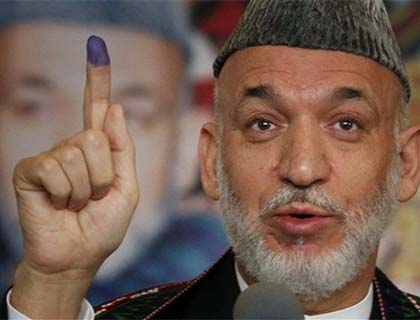A new survey about Afghan parliament reveals interesting findings. Conducted by Democracy International for USAID and completed in July 2012, the survey gives an overall portrayal of opinions among members of the National Assembly. Below are some excerpts from the survey.
An overwhelming majority of Afghan parliamentarians are in favor of adopting a new electoral law in Afghanistan. When asked if Afghanistan needs a new election law, nearly 90% of respondents agreed. A large majority of Afghan lawmakers want to either modify or replace the current voting system. Afghan parliamentarians demonstrate mixed feelings regarding the current electoral process.
A majority of Afghan MPs surveyed, 56.8% have a less than moderate amount of faith in the Afghan electoral process, with 41.5% of MPs reporting a fair amount of faith and 15.3% reporting they have no faith at all in the process. A mere 6.8% of respondents have strong faith in their electoral process.
The overwhelming majority of Afghan MPs surveyed, 71%, think the president has too much power in Afghanistan's current political system. Nearly two-thirds of respondents, 64.8%, believe that the president wields too much authority in making decisions on Afghanistan's electoral system. A large majority, 72.7% of surveyed MPs, believe international forces should stay as long as necessary in Afghanistan. A very small percentage of parliamentarians, 3.4%, feel that troops should leave the country within the year.
A majority of MPs surveyed support quotas for representation in parliament, especially the quota for women's representation. Of those who feel quotas are necessary, 53.4% feel they should be used for women. An overwhelming 81.8%, of those who agree quotas are necessary believe they should not be used to increase Kuchi representation.
Two out of three respondents, 65.9%, strongly agree that educational requirements should be a criterion for candidate eligibility. A strong majority, 84.7%, think that the electoral law should specify a campaign spending limit. A large plurality of respondents, 48.9%, disagrees that districts should be the basis for electoral constituencies rather than provinces.
Almost all MPs believe the current voter registration process needs much improvement. A large majority of surveyed MPs, 74.4%, agree that candidates should be allowed to appeal the decisions made by the IEC and the Electoral Complaints Commission (ECC). An overwhelming majority of Afghan MPs surveyed, 89.8%, feel that electoral laws should clearly define the distinction between criminal acts and electoral disputes.
A significant majority of Afghan MPs surveyed, 69.9%, believe that their primary constituency for representation is their province. A very small percentage of respondents, 6.3%, believe they represent their district, and even smaller percentages claimed to represent their village or Afghanistan as a whole. Interestingly, more than ten percent of respondents claim that their primary constituency is youth, regardless of geography or ethnicity.
More than half of Afghan parliamentarians surveyed, 59.1%, do not consider themselves a member of the political opposition. Less than a third, 30.7%, feels they are a part of the political opposition.
Three-fourths of Afghan MPs surveyed do not identify with a political party at all. Less than a fifth of respondents, 18.2%, report identifying with a party.
Of those who identify with a party, 15.8% say they are members of Mahaz-e-Milli, more than any other single party. However, since the small number of respondents, 32 out of 176, identify with a political party, the distribution among party affiliations in this data may not be meaningful.
Again, a very large majority of respondents, 72.7%, say they do not identify with any political coalition while only 14.8% of respondents do identify with a coalition. Of respondents who identify with a coalition, 40.9% identify with the Coalition for the Support of Law, 36.4% with the National Coalition of Afghanistan, and 22.7% with the National Front. However, because of the small number of respondents, 26 out of 176, reporting their affiliation with a coalition at all, these percentages may not reflect the actual ratio of coalition members in the parliament.
Most significant in the survey is the increasing calls for reform in electoral law. A major development in this regard was establishment of a 20-party coalition named Cooperation Council of Political Parties and Coalitions of Afghanistan that includes all major political parties/groups of the country.
The electoral reform being a popular burning issue, these political forces are striving for proper role of political parties in our system. The new coalition includes many groups who are in the Government de-facto coalition, but interestingly, they are calling for legal participation of political parties in the elections. It is the biggest crack in our political system that parties have no legitimate role in the electoral process and parliamentary affairs. It is time the Government should heed to the demands of opposition groups and take practical steps for reforms.
Legal role of political parties is inevitable for political transparency and credibility. It will increase mass political participation and activism, generating awareness, something that an overly centralized concentration of power, which is more like an electoral authoritarianism, does not want. The international community must push for steps to ensure long-term political stability in Afghanistan.

